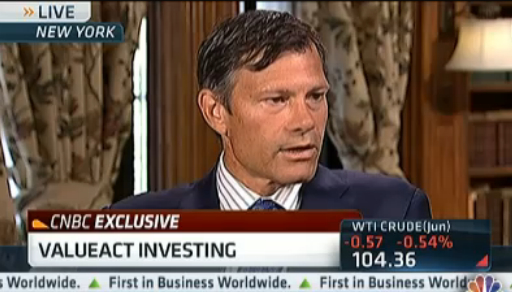If you follow Microsoft at all, you’re going to be hearing a lot about Jeffrey Ubben.

Ubben is the founder, CEO and chief investment officer of ValueAct Capital, the San Francisco-based hedge fund that has quickly made Microsoft its largest holding.
After months of rumors, ValueAct on Friday announced a “cooperation agreement” with Microsoft that includes the option to put the firm’s president, Mason Morfit, on the Microsoft board — the first time an activist investor has wedged its way into the Redmond company in this way.
So who is Ubben, and what is he doing? He isn’t talking publicly about the Microsoft investment, and he has kept a low-profile in general, but this CNBC interview from April 2012 (embedded above) helps to explain ValueAct’s strategy and, by extension, what’s happening at Microsoft now.
In the interview, Ubben explains that ValueAct takes a longer-term approach than most activist investors. Ubben doesn’t put it in these terms, but it sounds like his strategy is more a turning of the screw than a punch in the gut. And the first key step, after buying up a significant stake in a company, is getting a representative on the board.
“I’ve been surprised at how many boards we’ve ended up on, to be honest with you,” Ubben said. “It’s been like 30 out of 60 core investments.
How has it happened? Ubben said he believes boards recognize that ValueAct can play a “powerful” role. “It really is a profitable combination, this idea of someone that’s in the boardroom, that really understands the business, that has all the information — perfect information — and then is a driver of the capital allocation proces,” he said.

Translation: “Capital allocation process” means deciding which products and initiatives a company invests in.
But why does ValueAct only seek one board member, vs. a majority slate like other activist shareholders?
“Well, it might be temperament, to a certain extent, but I think we probably are more patient than your typical activist hedge fund. Our capital is long-term, it’s mostly locked-up money,” Ubben said.
He continued, “Our goal is to not come in with an agenda.” Instead, he said, the firm likes to lead “a fact-based decision-making process in the boardroom.”
“Surprisingly, boards will respond really positively to a non-emotional conversation where there’s more information being delivered than just information that comes from the CEO.
“It’s been increasingly easier for us to engage in a dialogue about ValueAct going on (a) board. … There’s a little bit of, “Oh my God, I’m a little more accountable as a CEO to my board because I’ve got somebody in the room that has a lot of money invested and has a different sense of urgency.’
“But we don’t come in guns blazing. We basically are rooting for the CEO. But if he’s missing budgets for three or four quarters then we might lead a discussion more aggressively than otherwise would have occurred.’ ”
Microsoft CEO Steve Ballmer has said pressure from ValueAct didn’t play a role in his decision to step down, announced a week ago. The Wall Street Journal reported Saturday, “A ValueAct official has said the same thing in at least one private conversation, according to a person familiar with the matter.”

However, keep in mind what happened in July: Microsoft was forced to take a $900 million charge against earnings after sales of the Surface RT tablet didn’t live up to expectations. Even without counting that charge, Windows revenue would have been down 6 percent, reflecting ongoing weakness in Microsoft’s core business, as the company struggles to crack the tablet and smartphone markets.
So what does ValueAct do once it gets on a board? “We get very involved with the company, we get very influential as a board member. And we get a control premium on the exit,” Ubben said.
Of course, it goes without saying, ValueAct is doing this to make money on its investment. These guys aren’t trying to change world with technology, unless it boosts the stock. The firm needs Microsoft’s share price to go up over the long run, and as a member of the board, it can take a hands-on approach, trying to help make that happen.
In a statement announcing the “cooperation agreement,” ValueAct’s Morfit said, “At this critical inflection point in the company’s evolution, I look forward to actively working together with the board and Microsoft’s management team to continue to create value for all shareholders.”
In the short run, ValueAct is believed to be aiming to get Microsoft to return more cash to shareholders, but Ubben makes it clear that they don’t just do this for the short run. In the case of Microsoft, there would be many more fundamental strategic decisions over the long term.
One giant decision on the horizon is the selection of Microsoft’s new CEO. Under the agreement, ValueAct has the option to put Morfit on the board at the first quarterly board meeting after the company’s annual shareholder meeting this fall. It wouldn’t be a surprise for Microsoft to name its next leader before then.
In the meantime, the agreement announced Friday “provides for regular meetings” between Morfit “and selected Microsoft directors and management to discuss a range of significant business issues,” according to the announcement.
Ubben said in the 2012 CNBC interview, “When we go on a board, it means we’re basically locking ourselves up, we’re getting married. We see a five-year opportunity to grow our capital 20 percent, and we think we can be partners with management.”
After 38 years in business, it’s incredible just how much has changed behind-the-scenes at Microsoft in a little more than a week. It’s going to be fascinating to watch all of this unfold.



